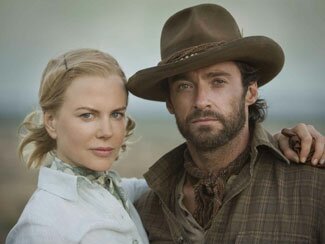MOVIE REVIEW- <i>Oz-stralia</i> : Down under flick's a downer
 If you're keeping track of the supposed award contenders being released at the end of the year, you can cross Australia off the list.
If you're keeping track of the supposed award contenders being released at the end of the year, you can cross Australia off the list.
Baz Luhrmann's pseudo-retro mystical historical Western romance war movie epic homage to The Wizard of Oz is a, need I say, mish-mash, after all that? Oh, and I didn't mention that it's a screed against racism.
Set between 1939 and 1942, Australia features lots of magnificent landscapes, often with figures silhouetted against sunsets (Gone with the Wind shots); but most of what happens in front of them appears phony, visually and emotionally. I was never really bored during the almost three-hours running time, but I was almost never fully engaged either.
Nicole Kidman, who is determined to show she can fit into any country in any period, visits her homeland– but playing an Englishwoman– in the early days of World War II. Her Lady Sarah Ashley is also determined, despite moments of clownlike broad comedy before she settles into the stock Kidman character.
Lady Ashley comes to Australia to force her cheating husband to sell his cattle station (i.e., ranch), Faraway Downs, and return with her to England. The first complication she runs into is that her husband has just been murdered. The second is that he'd been pressured to sell by King Carney (Bryan Brown), who owns all the other land and cattle in the Northern Territory. The third is that chief hand Neil Fletcher (David Wenham) is in cahoots with Carney and has been slipping unbranded cattle over to his herd.
Sarah discovers the last rather quickly and fires Fletcher, then learns about the fourth complication: The only way to avoid selling Faraway Downs to Carney is to drive 1,500 head of cattle to the port of Darwin to be sold to the army to feed the troops.
Fortunately, the Drover (Hugh Jackman) is available to lead the drive, but he has to fill the six assistant slots with a motley crew of white, black, yellow and brown people, including two women, a child, and a drunk.
The child, Nullah (Brandon Walters) is our narrator and the film's most appealing character. A non-professional discovered by Luhrmann when he was 11, Walters is the best thing about Australia. Nullah is soon orphaned, bringing out maternal instincts in the barren Sarah. He's a "creamy," or half-caste, subject to being rounded up by the local authorities and given to the church to raise, their goal being to "breed the black out of them."
Sarah stops mourning her husband as quickly as she gets a tan. Like her other transitions, she goes from stranger in a strange land to I-am-woman-hear-me-roar rather abruptly. She and Drover go through the usual romcom squabbling before getting down to pleasure, in a scene that pushes the limits of the PG-13 rating.
Though we never doubt Sarah and Drover are meant for each other, their love is off-again, on-again. When she settles in at Faraway Downs, he stays to manage the place during The Wet (rainy season) but goes off droving in The Dry. When he accepts a six-month gig droving for the army against her wishes, Sarah tells him not to bother coming back.
At the same time, Nullah, who was busted while on his walkabout, is being sent to Mission Island. Sarah promises to follow him, not having given up on her quest to adopt him.
Working-class or aristocrat, the white people are all racists– except Sarah and Drover. He's not even welcome in polite society because he used to be married to a black woman. His best mate is his Aboriginal brother-in-law, Magarri (David Ngoombujarra).
The Aboriginal culture is best represented (and exoticized) by Nullah's grandfather, King George, played by David Gulpilil. (Besides going on his own "Walkabout" in Nicolas Roeg's 1971 film of that name, Gulpilil appeared in Charlottesville five years ago at the Film Festival. In this film, he is everywhere, observing, guiding Nullah and doing magical things.
The Japanese, fresh from their victory at Pearl Harbor, bomb Darwin and Mission Island in the film's third act, setting up several climaxes and multiple endings.
Jackman makes a great impression in the early going, from initial shots straight out of a Sergio Leone Western to the incredible physique he displays in a (waist-up) shower scene to his overall demeanor as an old-fashioned macho action hero. Once he's somewhat domesticated he becomes less interesting.
Video alternatives: For a cattle drive (with real cows!) see Red River. For romance between a rugged outdoorsman and a blonde see Clark Gable with Jean Harlow in Red Dust or Grace Kelly in Mogambo. For children victimized by institutionalized racism in Australia, there's Rabbit-proof Fence (the American equivalent is When the Legends Die), and the best walkabout movie is the above-cited Walkabout.
And between the talk about The Wizard of Oz, clips and dialogue from the movie and 17 versions of "Over the Rainbow" in Australia, you may wish you'd stayed home and watched the original instead.
#